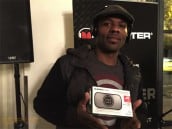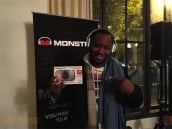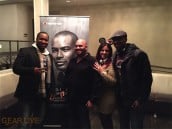Find Our Latest Video Reviews on YouTube!
If you want to stay on top of all of our video reviews of the latest tech, be sure to check out and subscribe to the Gear Live YouTube channel, hosted by Andru Edwards! It’s free!
Latest Gear Live Videos
Why do we have to turn off electronic devices during flight takeoff and landing?

Posted by Andru Edwards Categories: Editorial, Features, Handhelds, Transportation,
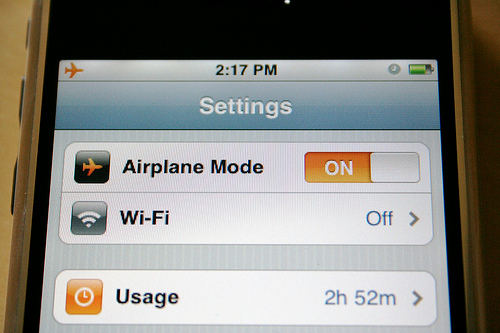
I must confess that I sometimes neglect to power down my iPad, iPhone, and other electronics during takeoff and landing. People near me also don't switch off their iPods either, and yet, despite flight attendants' instructions to turn off our electronics, the plane arrived at its destination safely.
Chances are, we weren't the only ones who broke the familiar rule. So just why does the Federal Aviation Agency (FAA) still require people to turn off their gadgets?
A Sunday report from the New York Times claims that even the FAA hasn't found proof that the use of electronics pose a threat during takeoff and landing. But FAA spokesperson Les Dorr told the Times that it would prefer to be overly cautious when it comes to the policy.
In 2006, the FAA commissioned the Radio Technical Commission for Aeronautics to test the effects of cell phones and other portable electronics on flights.
It concluded that there was "insufficient information to support changing the policies," Dorr said. "There was no evidence saying these devices can't interfere with a plane, and there was no evidence saying that they can."
Gallery: Why do we have to turn off electronic devices during flight takeoff and landing?
Advertisement
8 rules to get the best deals on Black Friday

Posted by Andru Edwards Categories: Editorial, Features, Hot Deals,
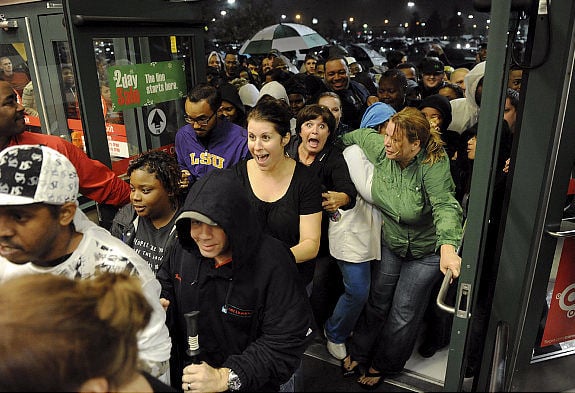
With the sheer number of sales and offers being flung around during Black Friday weekend, there's a chance that you may encounter an item you're interested in that doesn't appear in any ad. Although you can easily price compare offers from competing stores, how can you be certain that it's actually the best deal you can get? Below, we've detailed a few steps that you should take to ensure that your purchase is a wise one. And though you may feel pressure to move quickly on Black Friday — with extremely limited-time offers and deals selling out — a few moments spent researching will make you much less likely to regret your purchases later.
1. Know the Price History for the Item: Many people don't realize that there's an option on dealnews that allows you to view expired deals. This info is useful when assessing the dealworthiness of a current price for a specific item. If the model you're considering was offered for less a few weeks or months ago, it's probably a pretty weak Black Friday deal. We've noticed a few such offerings in the ads already, so be on the lookout.
2. Consider Other Colors: If you're not particular about the color of your item, it's worth doing a quick check to see if a less-mainstream colorway is seeing stronger discounts. For example, some of the deepest cuts on items like Vibram FiveFingers shoes tend to be brightly-colored styles. When searching for additional options, keep in mind that sometimes the model number integrates color information. (Cameras and camcorders frequently do this.) Simplify the model number to broaden your search, and you may find a blue camera for less than the standard black or silver model you were originally considering.
Click to continue reading 8 rules to get the best deals on Black Friday
Gallery: 8 rules to get the best deals on Black Friday
With iTunes Match, Apple has ended piracy as we know it

Posted by Andru Edwards Categories: Apple, Editorial, Music, Software,
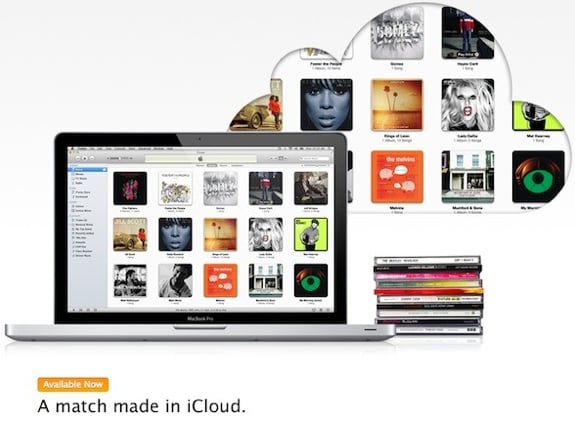
I belong to the MP3 generation. Mine was the first to confront the choice between an $18 CD filled with marginal tracks and free MP3 downloaded from Napster in minutes. It was a test of character, and like many of the MP3 generation, I failed. But my days as a copyright violator, music pirate, and intellectual property profiteer ended long ago, and after enabling iTunes Match, previous guilt is gone.
To be fair, I haven't actually stolen music in years. I actually have multiple music service subscriptions, mostly because I am too lazy to cancel when I switch. So I have access to Rdio, Zune Pass, Rhapsody, Slacker, and Spotify Premium. But the truth is, I have a 32GB music collection sitting on my home PC that was built illegally downloading from services like Napster, Limewire, and BitTorrent. But now Apple is offering me amnesty for just $25 a year.
Apple's iTunes 10.5.1 launched yesterday, and it includes the much-anticipated Match feature. Install the software and it will scan your hard drive for music and make high-quality, 256-Kbps AAC versions of every file available to you in the cloud. The kicker is that this includes not just songs you purchased through iTunes, but any music file on your system, no matter where or how you got it. It will cost $25 a year to maintain access to this newly rebuilt and legal library, but for that price you can have access to up to 25,000 songs. Apple will pay the labels a small fee for the rights, but all you pay is the $25 per year. For those of us in the MP3 generation, this is library liberation.
Click to continue reading With iTunes Match, Apple has ended piracy as we know it
Gallery: With iTunes Match, Apple has ended piracy as we know it
Could Steve Jobs have lived had he simply opted for traditional cancer treatment?

Posted by Andru Edwards Categories: Apple, Editorial,
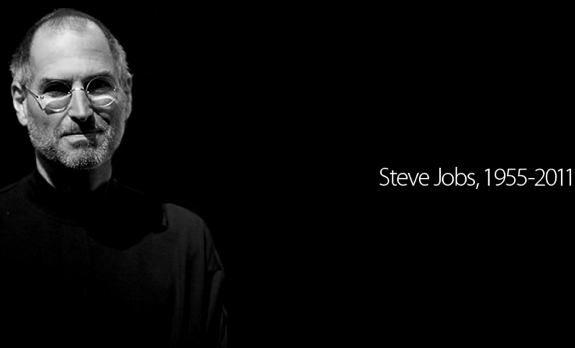
While browsing through Quora yesterday, I came across a question titled "Why did Steve Jobs choose not to effectively treat his cancer?" As someone who was deeply saddened by the death of Steve Jobs, I stopped and clicked to give it a read. If you're unfamiliar, Quora is a site that lets anyone ask a question, and anyone else can answer those questions. It works pretty well. The best answers get voted up by the community. As of this writing, there's an answer that has over 500 votes, written by Ramzi Amri, a surgical oncologist and Harvard medical faculty member. And it's chilling to read.
In a nutshell, Amri states that in his expert opinion, had Steve Jobs chosen to treat his pancreatic cancer using traditional methods from the get-go, he would likely have made a full recovery due to the type of cancer he had. Instead, Steve decided to undergo all sorts of alternative treatment options before opting for conventional medicine, and "it seems sound to assume that Mr. Jobs' choice for alternative medicine could have led to an unnecessary early death."
The post goes on to explain, in remarkably undertandable detail, the type of cancer that Jobs had, how it could have been treated, and why it would likely have been a success. It also talks about what happened instead due to Steve waiting and putting off traditional treatment.
Now, we aren't doctors (nor do we play them on TV,) but if true, we can say that it's a damn shame that the reason for the loss of Steve Jobs at the early age of 56 may have been avoided simply by making the decision to go with the traditional (highly successful) treatment for his condition. Of course, how we are all taken care of is our own personal choice, a choice that Steve himself had as well, but that makes it no less difficult to fathom.
Gallery: Could Steve Jobs have lived had he simply opted for traditional cancer treatment?
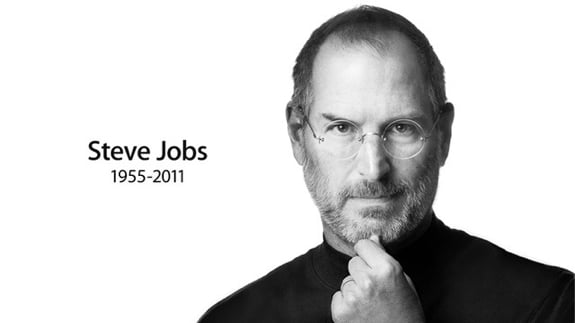
Steve Jobs, the enigmatic and elusive chief executive of Apple, has died. He was 56.
His passing comes just one day after Apple unveiled its latest smartphone, the iPhone 4S. Tim Cook, the company's new CEO took the stage on Tuesday to unveil the phone and champion the many successes that Apple had accomplished under Jobs's tenure. Many of us hoped that the company's signature "one more thing" would be an appearance by Jobs, but we had to suffice with Cupertino's new product lineup, which Jobs no doubt had a hand in guiding.
Though Jobs suffered through various health setbacks in the past few years, he helped shape Apple into the powerhouse it is today. Few companies have people lined up around the block for their latest smartphone and hardware manufacturers would love even a fraction of Apple's iPad market share. Yesterday, Cook said that Apple has now sold 250 million iOS devices, all of which had to pass muster with the notoriously meticulous Jobs.
During his time in the tech spotlight, Jobs amassed a personal fortune of $8.3 billion, according to the latest figures from Forbes. He inspired an action figure, a fake blog persona, and numerous parodies featuring admirers donning his trademark uniform of black turtlenecks and jeans.
It wasn't always that way, though. Apple started like many a tech startup – in a garage. It was 1976 and the product was the Apple-1. There was no casing, power supply, keyboard, or monitor, and it was $700. Jobs and co-founder Steve Wozniak only sold about 200 of the devices, making about $20 each, but they had more success with the Apple II.
Click to continue reading Steve Jobs, 1955-2011
Gallery: Steve Jobs, 1955-2011
Tech, political, celebrity communities pay tribute to Steve Jobs

Posted by Andru Edwards Categories: Apple, Editorial,
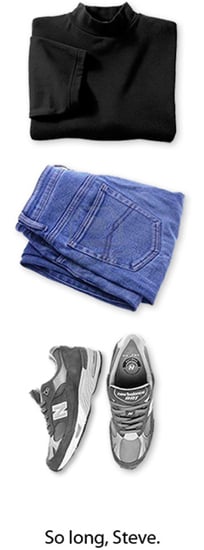
The death of Steve Jobs has generated tributes from the Apple visionary's colleagues, peers, rivals, and many who simply admired him from afar. Here's a roundup of what some of those people were saying in publicly released statements and on social media sites like Twitter and Facebook about Jobs after news of his passing was confirmed on Wednesday:
"Michelle and I are saddened to learn of the passing of Steve Jobs. Steve was among the greatest of American innovators - brave enough to think differently, bold enough to believe he could change the world, and talented enough to do it.
"By building one of the planet's most successful companies from his garage, he exemplified the spirit of American ingenuity. By making computers personal and putting the internet in our pockets, he made the information revolution not only accessible, but intuitive and fun.
"And by turning his talents to storytelling, he has brought joy to millions of children and grownups alike. Steve was fond of saying that he lived every day like it was his last.
"Because he did, he transformed our lives, redefined entire industries, and achieved one of the rarest feats in human history: he changed the way each of us sees the world.
"The world has lost a visionary. And there may be no greater tribute to Steve's success than the fact that much of the world learned of his passing on a device he invented. Michelle and I send our thoughts and prayers to Steve's wife Laurene, his family, and all those who loved him."
—U.S. President Barack Obama and First Lady Michelle Obama
Click to continue reading Tech, political, celebrity communities pay tribute to Steve Jobs
Gallery: Tech, political, celebrity communities pay tribute to Steve Jobs
Steve Jobs died peacefully, according to family

Posted by Andru Edwards Categories: Apple, Editorial,

The family of former Apple chief executive Steve Jobs said that he died "peacefully" on Wednesday, surrounded by his family. A memorial Web site will be posted.
Jobs passed away at the age of 56. Jobs is survived by his wife Laurene and two children, as well as a daughter from a previous relationship.
On August 24, Jobs stepped down, stating that he could no longer meet his duties and expectations as Apple's chief executive. Jobs was diagnosed with and treated for a rare type of pancreatic cancer in 2004, but he said the 2009 absence was not a resurgence of that cancer. He took a medical leave of absence in January.
In a statement, Jobs' family said he died peacefully.
Click to continue reading Steve Jobs died peacefully, according to family
Gallery: Steve Jobs died peacefully, according to family
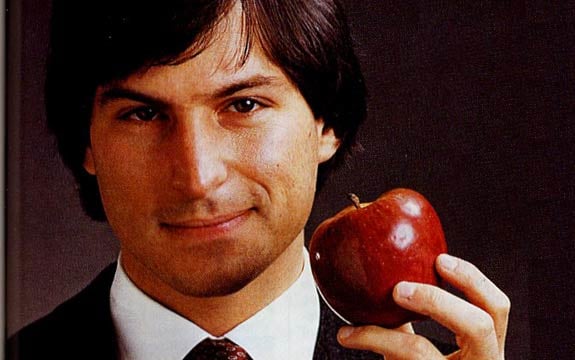
October 5, 2011 will go down as one of the most bittersweet moments in technology history. Apple chief executive Steve Jobs passed away at 56, a sad end to a magnificent careeer.
Jobs wowed us. The man is the Walt Disney of the technology space – funny, in a way, as he's also Disney's largest shareholder. Apple, Pixar, Disney – three technology icons synonymous with magic.
I can't claim to have known Jobs personally. What I, and we, have seen of him, has been in carefully managed stage appearances over the years, with Jobs rolling out product after product that defined and launched industries, and prompted countless imitations. The Chinese even copied Apple's stores.
I remember how incredibly annoyed I was at Computex, wandering the halls and seeing row after row of candy-colored hardware, virtually everything that you could think of. I remember complaining to the guy who was on the stool next to mine at the hotel bar. Seriously, I said, is this the future? Watermelon-colored computers? And this Taiwanese guy, not even in technology, said something that's stuck with me: "Only until Apple invents whatever's next."
Click to continue reading The influence of Steve Jobs
Gallery: The influence of Steve Jobs
Why Apple is announcing the iPhone 5 in October instead of June

Posted by Andru Edwards Categories: Apple, Smartphones, Editorial, Software,
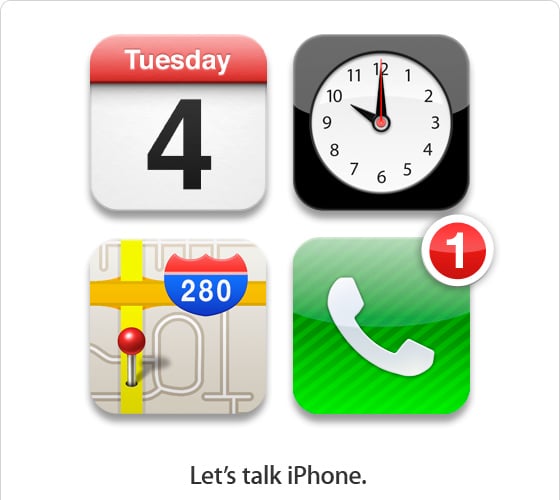
The iPhone 5 will be revealed in under an hour. In all likelihood, it won't be called that—that's just the general name people are calling the device, since it will technically be the fifth iPhone model from Apple. As with any iPhone launch, there have been the obligatory predictions, analysis, and mountains of rumors, but this launch is different from previous ones in a big and obvious way: Apple is unveiling the next iPhone in the fall instead of summer. Why?
It used to be there was a kind of unwritten agreement between Apple and its customers. Apple didn't say word one about any of its products until they were on the verge of general release. On the other side, customers and observers—the whole world, really—could rely on an extremely regular product release schedule: iPods in the fall, iPads in the winter/spring, and iPhones in the summer. It was so predictable you could plan vacations around it.
Click to continue reading Why Apple is announcing the iPhone 5 in October instead of June
Gallery: Why Apple is announcing the iPhone 5 in October instead of June
TiVo Premiere Elite: TiVo’s swan song?

Posted by Andru Edwards Categories: Editorial, Home Entertainment,

I've been a TiVo fan for many years, and a subscriber for about ten of those years. I've had various TiVo machines and have been happy with the performance of my HD TiVo. But like any tech-geek, I'm always interested in what's new.
The TiVo Premiere, released last year, intrigued me because of its HD interface, improved UI, larger storage capacity, and 1080p support. The specs sounded great and I was ready to upgrade my system, but as it approached time to pull the trigger, I began hearing stories of sluggish UI performance. Threads posted on TiVoCommunity.com indicate that the second core of the dual-core processor is disabled for stability reasons, thus crippling its Flash-based interface.
This week, TiVo announced the Premiere Elite ($499), which features four tuners and 2 terabytes of storage. Will it have a better processor that will take advantage of the HD UI or will it be more of the same? Unfortunately, I have a hunch that it will be more of the same.
Click to continue reading TiVo Premiere Elite: TiVo’s swan song?


